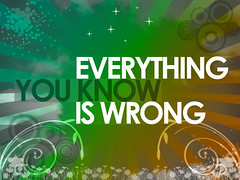I am reading a fascinating book at the moment, called "Deadly Decisions - how false knowledge sank the titanic, blew up the shuttle and led America into war" (and not just America either)
The author, Christopher Burns, looks at decision making from a human point of view, exploring how people and groups filter information and knowledge, and how mistakes in that process can occur.
One of the biggest problems is the persistence of false knowledge - and just how difficult it can be to persuade people that they are wrong (or even to admit to yourself that you are wrong). People have an amazing ability to force-fit new facts into a pre-existing model, and if they don't fit, to ignore them completely.
As a classic example, he quotes Johannes Kepler, the astronomer who first realised that the planets orbit the sun in elliptical orbits.
"For ten years Kepler dismissed his data as false, since he knew perfectly well that orbits could only be circular. "I was almost driven to madness in considering and calculating this matter," he wrote later. "I could not find out why the planet would rather go on an elliptical orbit [than a circular one]. Oh, ridiculous me." Making a change in so fundamental a scientific concept was profoundly difficult, but exhausted and humbled by his failure, Kepler fell back in his chair, looked out the window, and entertained for the first rime the possibility that the evidence might be correct.If such an eminent scientist struggles for ten years to challenge a mental model, imagine how difficult it will be in ordinary work situations. Just presenting knowledge to people is not enough. They have to grapple with the new knowledge, internalise it, allow it to challenge existing practices and models, until they too can say "Oh ridiculous me - my existing knowledge is false; I must make a change"





1 comment:
Profound and true... So how can we stand on the shoulders of great leaders of our past, hold true to our convictions and yet be humble enough to see when we've been wrong, admit to it, and change?
Post a Comment